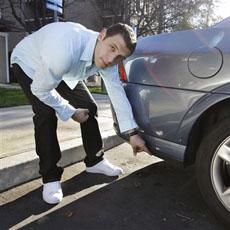This is the VOA Special English Technology Report.
The satellite-based Global Positioning System is a great way to locate places -- or people. But last week the United States Supreme Court ruled that law enforcement officials must get approval from a judge before placing a GPS device on a vehicle.
The case involved a suspected drug dealer in Washington. Police put a GPS device on his car and tracked his movements for almost a month. That led them to a house with nearly 100 kilograms of cocaine and 850,000 dollars in cash.
Antoine Jones was found guilty and sentenced to life in prison. He appealed his case all the way to the Supreme Court.
Law professor Christopher Slobogin at Vanderbilt University in Nashville, Tennessee, takes the story from there.

CHRISTOPHER SLOBOGIN: "Mr Jones' argued that that evidence was obtained illegally because the police did not have a warrant. And his argument was in essence that use of the tracking device was an unconstitutional search under the Fourth Amendment to the United States Constitution, which provides that the government may not engage in unreasonable searches and seizures. Mr Jones claimed that the absence of a warrant made this search unreasonable."
And, says Professor Slobogin, the high court agreed.
CHRISTOPHER SLOBOGIN: "All nine members of the court, conservative members as well as liberal members, decided that the Fourth Amendment was violated in this case."
But the ruling only dealt with the physical act of placing the GPS device on the vehicle and tracking Mr Jones. Justice Antonin Scalia wrote the majority opinion. Justice Scalia said the case did not require the court to decide if electronic monitoring without trespassing onto someone's property is also a violation of privacy.
Law professor Renee Hutchins at the University of Maryland says that is a big question that remains to be answered. We spoke with her on Skype.
RENEE HUTCHINS: "Most people have smartphones. A lot of people have cars that have GPS pre-installed. So the government doesn't have to do the installation. The installation, which was the hook for Justice Scalia, is already accomplished. We do it voluntarily."
Justice Sonya Sotomayor suggested that modern technology may soon force us to reconsider expectations of privacy. Professor Hutchins explains.
RENEE HUTCHINS: "Justice Sotomayor, actually in talking about the modern society that we live in, said, you know, we really have to perhaps rethink what it means for things to be private in a world where we voluntarily give up so much information. In a world where there's Facebook and GPS on your cell phone and GPS in your car, how should the court be thinking about constitutional protections in a world like that?"
Four other justices, led by Samuel Alito, questioned the wisdom of limiting the ruling only to a trespass of private property. They said the more important issue is the use of GPS for the purpose of long-term tracking.
And that's the VOA Special English Technology Report, written by June Simms. I'm Steve Ember.
A mobile app in Delhi aims to protect women
Satellite navigation system launched
(来源:VOA 编辑:Rosy)
